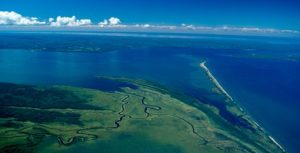Save the Date:
UPDATE: “Working Effectively with Tribal Communities”, Lac du Flambeau WI
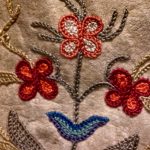 Due to Covid-19, this in-person professional development workshop has been postponed, but will be held as soon as it is safe for participants and elders to attend. Please check back for updates on the workshop date.
Due to Covid-19, this in-person professional development workshop has been postponed, but will be held as soon as it is safe for participants and elders to attend. Please check back for updates on the workshop date.
This professional development training program is designed to help UW Madison, Division of Extension, and Wisconsin Department of Natural Resource professionals build more effective relationships with tribal communities. This experiential program will build knowledge of tribal sovereignty, traditional knowledge, culture, and treaty rights to foster collaborations with Native Nations. For more information contact Brian Gauthier, brian.gauthier@wisc.edu
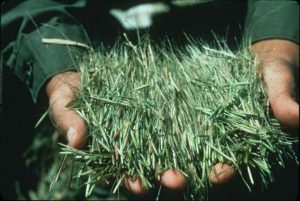 Seven Generations Inter Tribal Leadership Summit – “Innovation in Education“- October 3 & 4, 2019
Seven Generations Inter Tribal Leadership Summit – “Innovation in Education“- October 3 & 4, 2019
The Seven Generations Inter-Tribal Leadership Summit took place October 3 – 4, 2019 at Lac Courte Oreilles Ojibwa Community College. The Summit provided a forum for tribal leadership, educators, students, elders and community members to:
- Learn from educators and industry professionals in 4 key areas
- Education/Technology/Culture & Language Reclamation
- Economic/Workforce Development
- Health/Medicine/Safety
- Environment: Research, Protection, Policy/Legislation
- Expand their networks and develop new partnerships
- Practice visioning for the future
- Engage in discourse concerning various interests for tribal communities
- Ground ourselves in our culture while looking to the future
A copy of the program agenda can be found here: 7 generations inter tribal leadership summit program agenda 3-4oct2019
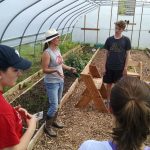
 Working Effectively with Tribal Communities Training – June 5-6, 2018
Working Effectively with Tribal Communities Training – June 5-6, 2018
Co-hosted by Lac Courte Oreilles Ojibwa Community College and the Cooperative Extension Native American Task Force
This training session brought approximately 45 University of Wisconsin educators and Wisconsin Department of Natural Resource staff together to learn about how to work more effectively with tribal nations. The workshop featured presentations on tribal sovereignty, treaty rights, culture perspectives by Mr. James Schlender, Jr., Lac Courte Oreilles Tribal Court Judge. Participants toured the LCO college and cultural education outreach sites. Water Walker MaryEllen Baker shared her thoughts on working together.
Dr. Annie Jones, U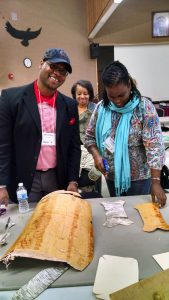 W-Extension Organizational Development and Tribal Nations Specialist demonstrated action planning using the Medicine Wheel Activity followed by breakout sessions to were participants developed programming plans. A culture activity concluded the 2-day workshop where LCO tribal members taught how to make wild ricing sticks, birch bark containers, and beaded earrings . Chi Miigwech (thank you) to the LCO staff and tribal members who helped provide the cultural lunches and presentations. Here’s what we learned: Working effectively with tribal communities workshop agenda
W-Extension Organizational Development and Tribal Nations Specialist demonstrated action planning using the Medicine Wheel Activity followed by breakout sessions to were participants developed programming plans. A culture activity concluded the 2-day workshop where LCO tribal members taught how to make wild ricing sticks, birch bark containers, and beaded earrings . Chi Miigwech (thank you) to the LCO staff and tribal members who helped provide the cultural lunches and presentations. Here’s what we learned: Working effectively with tribal communities workshop agenda
2017-2019 Native Nations – University of Wisconsin (UW) Working Group – STRATEGIC PLAN
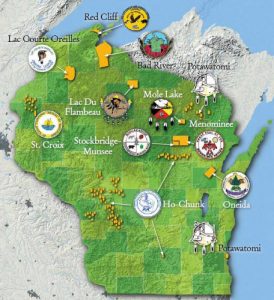 Native Nations_UW Strategic Plan Sept 2017
Native Nations_UW Strategic Plan Sept 2017
To commemorate the Society of American Indians’ 1914 visit to the UW-Madison campus, the Nelson Institute worked with campus partners to host the UW-Native Nations Summit on Environmental and Health Sovereignty on the University of Wisconsin-Madison campus in March 2015. At the Summit we resolved to strengthen our partnerships with Tribal communities.
In May 2016, the provosts of UW-Madison, University of Wisconsin Colleges, and University of Wisconsin-Extension collectively authorized a new initiative: the Native Nations UW (NN-UW) Working Group, committed to working toward creating broad educational networks, respectful research relationships, and culturally competent engagement programs. NN-UW acknowledges and supports the overall goal of strengthening Tribal sovereignty, particularly with regard to education, environment, health, and sustainable community development.
In summer and fall of 2016, the NN-UW Working Group engaged in listening sessions at Wisconsin Native Nations, the Milwaukee urban Indian community, and with Native students at UW Madison. The group convened diverse UW constituent communities to create a plan to move forward, pool resources and invite Native Nations to shape strategic planning, and to offer feedback and guidance throughout the planning process.
For more information visit the UW Native Nations Partnership web site: http://nativenations.nelson.wisc.edu/index.php
Milwaukee Area Indian Resource Network (MAIRN) Directory of Resources- now available
The Milwaukee Area Indian Resource Network (MAIRN) is comprised of American Indian organizations, community members, and representatives in the Milwaukee area. Members of MAIRN have shown a commitment to the American Indian population in Milwaukee. Click here for the MAIRN resource directory. For more information on the MAIRN list, please email Alyssa Miller.
American Indian Memoir Mixes ‘Good Seeds’ with Good Stories for Great Food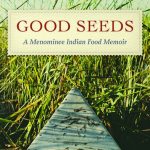
For Menominee Indians, the “Good Seeds” of life are the manoomin or wild rice that also gives the tribe its name. In this new Wisconsin Historical Society Press food memoir, Good Seeds, author and tribal member Thomas Pecore Weso takes readers on a cook’s journey through the North Woods tribal lands. Drawing from his rare perspective as a Native anthropologist and artist, he mixes a poignant personal story with the seeds of Menominee cooking traditions. With humor and heart, Weso folds Reservation life with ingredients that are not in most cooks’ pantries.From squirrel and beaver to dried corn and blackberries, he serves up the rich food culture of the Menominee Indian Nation and connects Menominee food–like trout, wild rice, maple sugar, partridge, and more–to the colorful individuals who taught him Indigenous values, including his medicine man grandfather, Moon, and his grandmother Jennie. Thomas Pecore Weso is an enrolled member of the Menominee Indian Nation of Wisconsin.
How to order: “Good Seeds: A Menominee Indian Food Memoir” Hardcover: $19.95 / 96 pages, 5 1/2 x 8 1/2 / ISBN: 978-0-87020-771-6
For retail and wholesale orders, contact: Chicago Distribution Center, Phone: (800) 621-2736 or email: custserv@press.uchicago.edu. For individual orders: Order by phone toll free at (888) 999-1669, or shop online at: www.wisconsinhistory.org/shop , or shop in person at the Wisconsin Historical Museum store, 30 N. Carroll St., Madison Wis. 53703. An e-book edition of “Good Seeds” is also available.
Bad River Flood Chronology Video – Bad River Tribal Youth Media participants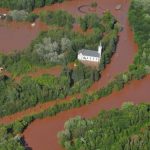
This video is a chronology of the July 11, 2016 Bad River Flood and its impacts on the community, culture, and environment. This video was filmed by Bad River youth who were present in the community learning about how to produce videos time of the flood emergency. Watch it on YouTube at:
https://www.youtube.com/watch?v=RRMsSHEfoAo .
Produced by: UW-Madison Mentors: Patty Loew, Tim Coursen, Don Stanley, and Tim Fish; Tribal
Youth Media Participants-Reporter Donavin O’Claire and Videographer Zachy Oja.
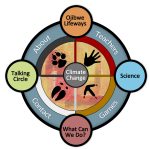 “Gikinoo’wizhiwe Onji Waaban” (Guiding for Tomorrow) “G-WOW” Changing Climate, Changing Culture Initiative www.g-wow.org
“Gikinoo’wizhiwe Onji Waaban” (Guiding for Tomorrow) “G-WOW” Changing Climate, Changing Culture Initiative www.g-wow.org
“G-WOW” is a unique model for increasing people’s knowledge of climate change by integrating scientific research with real world evidence of how climate change is affecting traditional Ojibwe lifeways, and people of all cultures. Four seasonal cultural units are featured linked by a unit on water and climate change. Teaching resources, games, and service learning projects are featured. G-WOW brings Native perspectives to addressing issue of climate change and incorporates Ojibwe language and cultural components. The project’s service learning approach promotes community level action to mitigate or adapt to a changing climate, no matter what your culture.
Water Way Walk – May 9, 2015 – Lac du Flambeau community
Honoring Mother Earth on Mother’s Day Weekend. A beautiful video capturing the purpose of this event to energize, honor and pray for Mother Earth’s life-blood, the water, which brings healing. https://www.youtube.com/watch?v=3495YXH2sgU
“Follow the Drop” through the Bad River Watershed. These student filmed documentaries created at the 2013 Earth Partnership for Schools Institute under the guidance of UW Instructional Communications Professor Patty Loew document water quality issues and opportunities within the Bad River Watershed from its headwaters at Caroline Lake to the Kakagon Sloughs and Bad River tribal wild rice beds at Lake Superior. https://fyi.extension.wisc.edu/nglvc/ee-for-me/coastal-curriculum/bad-river-watershed-videos/
Sturgeon Are Coming Home: KEWAEHMAKAT PIATAEH (Menominee)
The sturgeon fish is a spiritual clan animal in the Menominee Nation’s creation story. For thousands of years the sturgeon fish has provided the Menominee Indian Tribe of Wisconsin with food, medicine, sustenance and their cultural identity. For the last century dams that were built have prevented the sturgeon fish from migrating to their Reservation. Today efforts to restore the lake sturgeon to their Reservation through the help of the Department of Natural Resources have proven promising. https://www.youtube.com/watch?v=Ca1NhQy_Jls
Bad River Gitiganing Community Garden and Other Food Systems Projects, Wisconsin 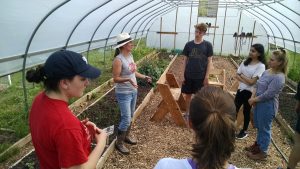
Tribal Histories Project Shares the Stories of the Sovereign Nations in Wisconsin
Storytellers from each of 11 sovereign nations located in Wisconsin share the unique histories of their people and communities in a Wisconsin Public Television (WPT) series of Tribal Histories documentaries.
Menominee History: http://video.wpt.org/video/2365306294/
Oneida History: http://video.wpt.org/video/2365306261/
Potawatomi History: http://video.wpt.org/video/2365306300/
